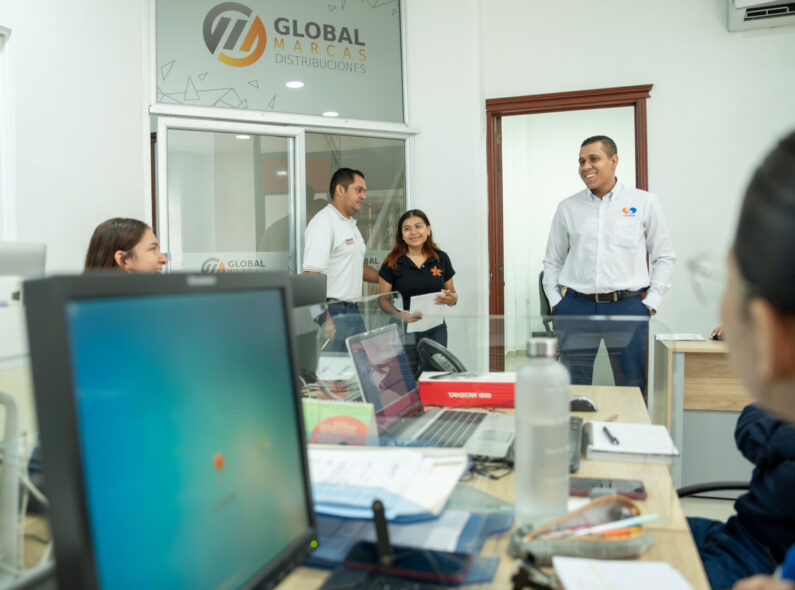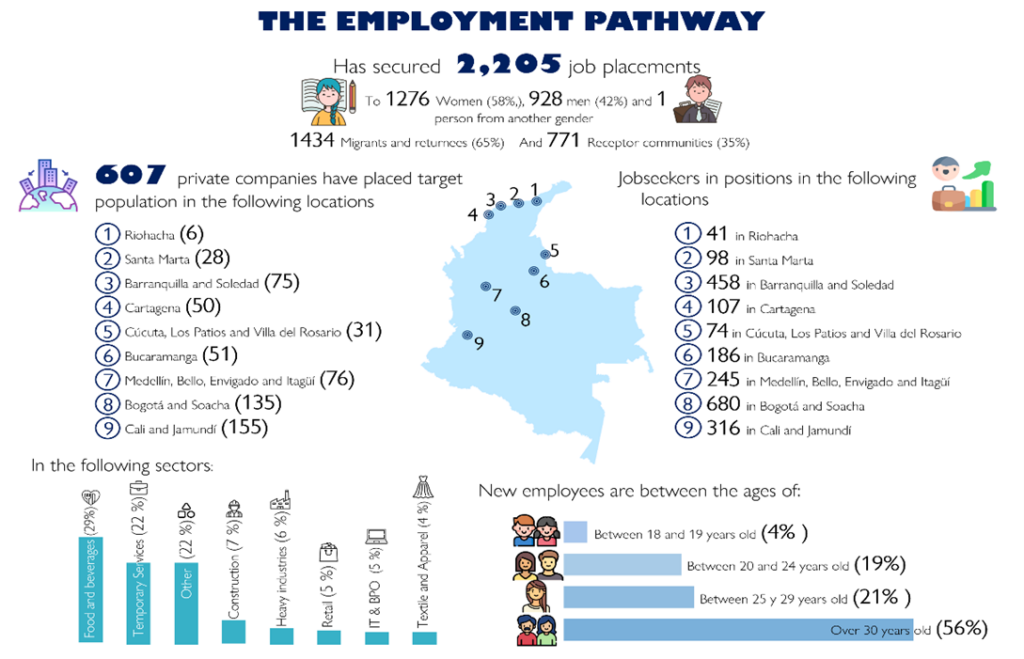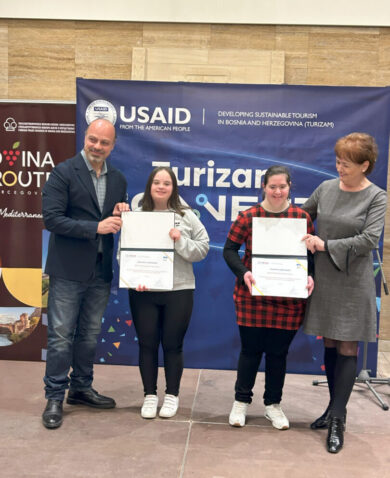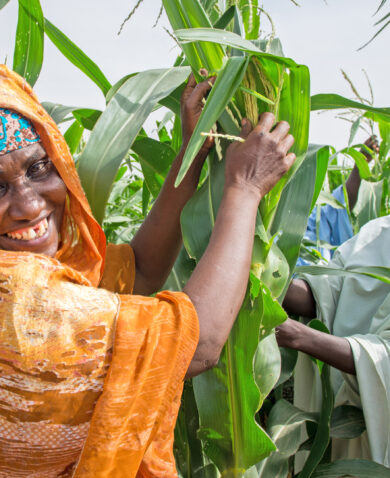
Through Localization, Colombia is Driving Employment for Migrants
December 19, 2023 | 5 Minute ReadWe are making market systems work for migrants by engaging both job seekers and employers to meet their needs.
Around the world, migrants, refugees, and returnees struggle to find quality, dignified livelihoods with which to rebuild their lives in their new communities. For receptor communities, the arrival of migrants can be destabilizing, stoking fears of worker displacement and increased crime; and assistance for migrants can foster or exacerbate xenophobic sentiments.
Since 2018, roughly eight million migrants have fled the economic and political instability in Venezuela. Nearly three million sought refuge in Colombia, approximately 80% with an intention of staying permanently, according to the latest migrant data from Colombia’s National Administrative Department of Statistics (DANE). Additionally, Colombia has welcomed back nearly one million Colombian returnees with integration needs distinct from those of the greater migrant population. Though the country has made positive steps towards welcoming migrants and returnees and formalizing their status, significant challenges remain to effectively integrate these populations into their local communities and economies and cultivate arraigo, or rootedness, for the long term. In response, in 2022 USAID launched the Opportunities without Borders Activity (OSF, per its acronym in Spanish), a task order under the USAID/Colombia Venezuela Response and Integration IDIQ.
OSF works across Colombia’s major population centers (Barranquilla, Bogotá, Cali, Cúcuta, Medellín, Riohacha, Bucaramanga, Cartagena, and Santa Marta), generating formal employment and entrepreneurship opportunities for migrants, returnees, and their receptor communities to reposition migration as a positive opportunity for communities and the country’s economic competitiveness.
A Business Case for Migration
Migrants and returnees have much to contribute to receptor communities and economies. As emphasized by the World Bank’s Migrants, Refugees, and Societies report, migrants can increase productivity and diversify workforce skills, which are a major benefit to a destination country’s economy. This is especially true for Venezuelan migrants in Colombia, who are largely of working age, hail from varied socioeconomic backgrounds, and have a wide range of skills and education, according to DANE’s Pulso de la Migración data. However, migrants face immense barriers to employment, including discrimination, administrative hurdles related to their immigration status and skills or academic accreditation, and a lack of knowledge regarding the dynamics in the local labor market. Further, even as private sector firms consistently cite labor supply challenges as a bottleneck to hiring, they are frequently unaware of the legal mechanisms that permit them to access well-qualified migrant and returnee workers or are disconnected from the receptor community networks that would direct them toward these job seekers. As a result, migrants tend to accept informal, low-paying roles well below their educational level or skill sets, and sometimes even dangerous jobs that may increase their vulnerability to criminal networks and human trafficking. OSF cultivates economic opportunities by and for migrants to bridge this gap and yield economic prosperity for migrants and their receptor communities alike.

Making Labor Market Systems Work for Migrants and Their Communities
To make market systems work for migrants, OSF developed tailored interventions in each target geographic area to help guide this population along their journeys toward employment. Using labor market analysis, OSF identified concrete needs across various points in the local employment ecosystems and developed solutions for two critical sets of players: migrant and returnee job seekers and private enterprises with hiring needs. With this understanding, OSF tapped influential actors in each metropolitan area’s market system to leverage their established reputations, networks, and proximity to migrants and returnees to improve outcomes along their paths to employment.
To engage job seekers, OSF collaborates with ongoing migrant integration activities in receptor communities, such as VRI’s first task order, the Migration Management Activity, or Integra, which focuses on legal pathways for migrants and social cohesion. With sustainability in mind, OSF tapped 14 local partners— public employment services agencies, civil society organizations, and family compensation funds—to spearhead this work, ensuring that solutions are driven by existing players in the local market. These partners provide skills training in customer service, manufacturing, food handling and cooking, and sewing, in line with OSF’s priority sectors, to prepare and match qualified candidates with employer openings, thereby alleviating the supply-demand bottleneck in the labor market for migrants, returnees, and their communities. Additionally, many Venezuelan migrants are already highly skilled or educated, but may lack formal credentials due to the unique circumstances of their migration. As such, OSF supports migrants to obtain skills certifications, particularly certifications for technical competencies that are required or highly desired by private sector employers. Our local partners help migrants navigate the processes to validate existing academic degrees, which is a costly and time-consuming process. OSF’s partners have supported 851 individuals with guidance on the process and subsidizing application fees, better positioning highly educated migrants for jobs in engineering, medicine, law, and accounting. This range of activities collectively represents an employment “pathway” that improves resilience, retention, and rootedness among migrant job seekers.

To engage the demand side, OSF works with private sector firms, such as medium and large businesses like Grupo Éxito, Sodexo, or Claro to 1) identify employer needs and alignment with migrant skill sets, and 2) raise awareness on the benefits of hiring migrants and the regulatory frameworks that permit it. Since its startup, OSF has engaged 202 enterprises to secure commitments to promote the economic inclusion of migrants, with an emphasis on five sectors with significant inclusion opportunities for migrants and returnees: 1) tourism, 2) technology-based services, 3) food and beverages, 4) textile and apparel, and 5) construction. In parallel, OSF is also developing communications campaigns and tools that raise awareness of the migration context and highlight the value-add of migrant employees. For example, OSF supported the dissemination of the Entrelazando campaign—a collaboration between the Ministry of Labor, Public Employment Service, International Labor Organization, and Fundación ANDI to raise awareness among Colombian employers on the benefits and steps to take when hiring migrant workers and reduce the perception that employing migrants is difficult.
Early Returns on Investment
Less than two years in, initial results signal that OSF’s efforts to collaborate and co-create with local actors are meeting migrants where they are and steering local labor market systems toward a more inclusive future for migrants and receptor communities. More than 2,200 migrants, Colombian returnees, and receptor community members have full-time jobs they did not have 12-24 months ago. Additionally, OSF’s job skills training initiatives have supported 3,604 people to receive certifications in technical competencies—positioning migrants and returnees for higher paying and higher-demand job opportunities.
OSF’s initial results already paint a promising picture in Colombia. By engaging and connecting a range of stakeholders across the existing market system, OSF supports more effective migrant labor inclusion, stakeholder buy-in, and a positive, lasting effect on the market systems in its target geographic areas. Looking ahead, it will be important to support long-term integration mechanisms across the region and establish a longer-term evidence base surrounding labor market impacts of such efforts, as recommended by the Migration Policy Institute. OSF will continue sharing its lessons learned for consideration in other contexts that work to promote economic growth and include migrants and/or other historically marginalized groups.
Banner image caption: A women works in a garment factory. The photo was taken by the USAID-funded OSF Activity.
Posts on the blog represent the views of the authors and do not necessarily represent the views of Chemonics.

































